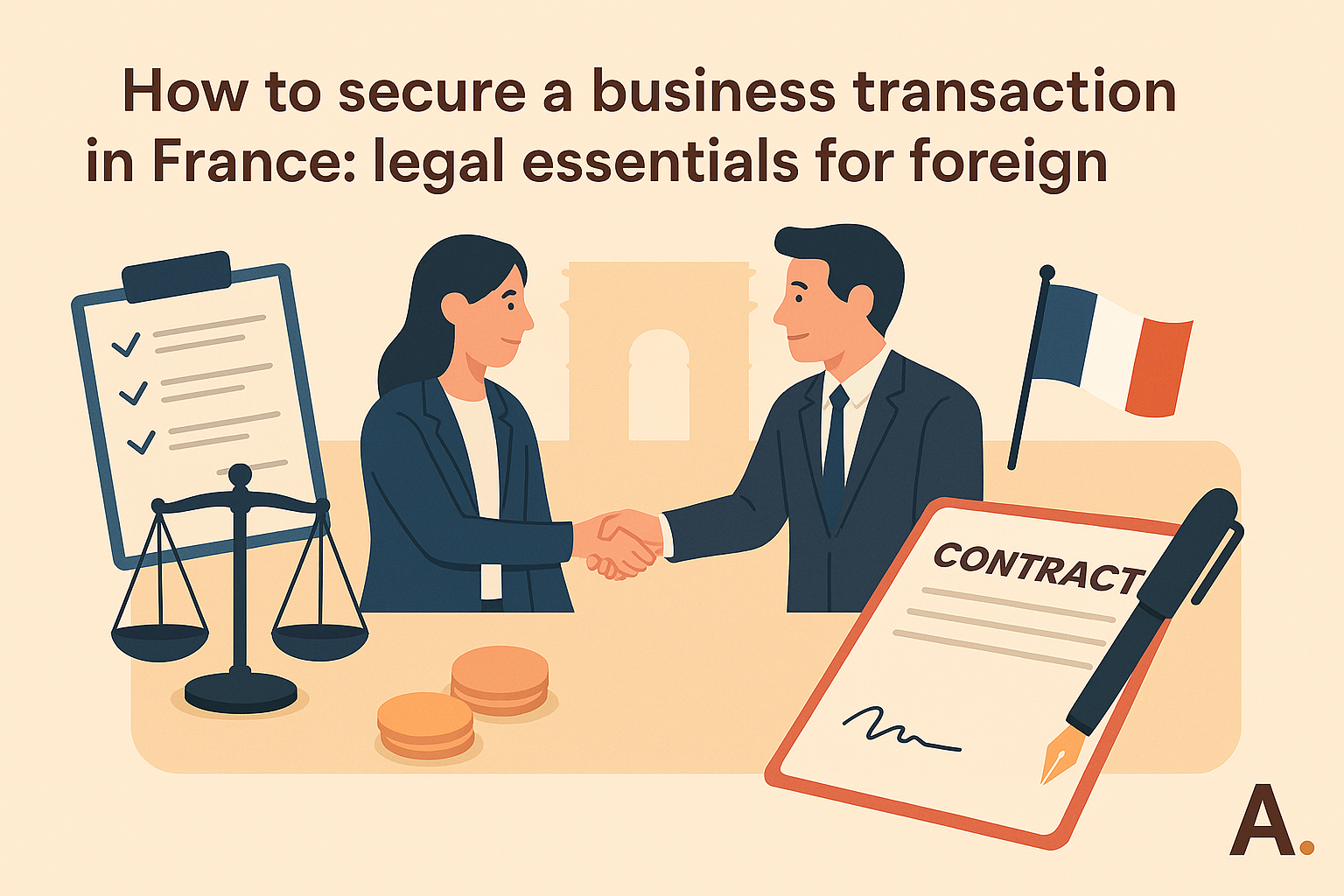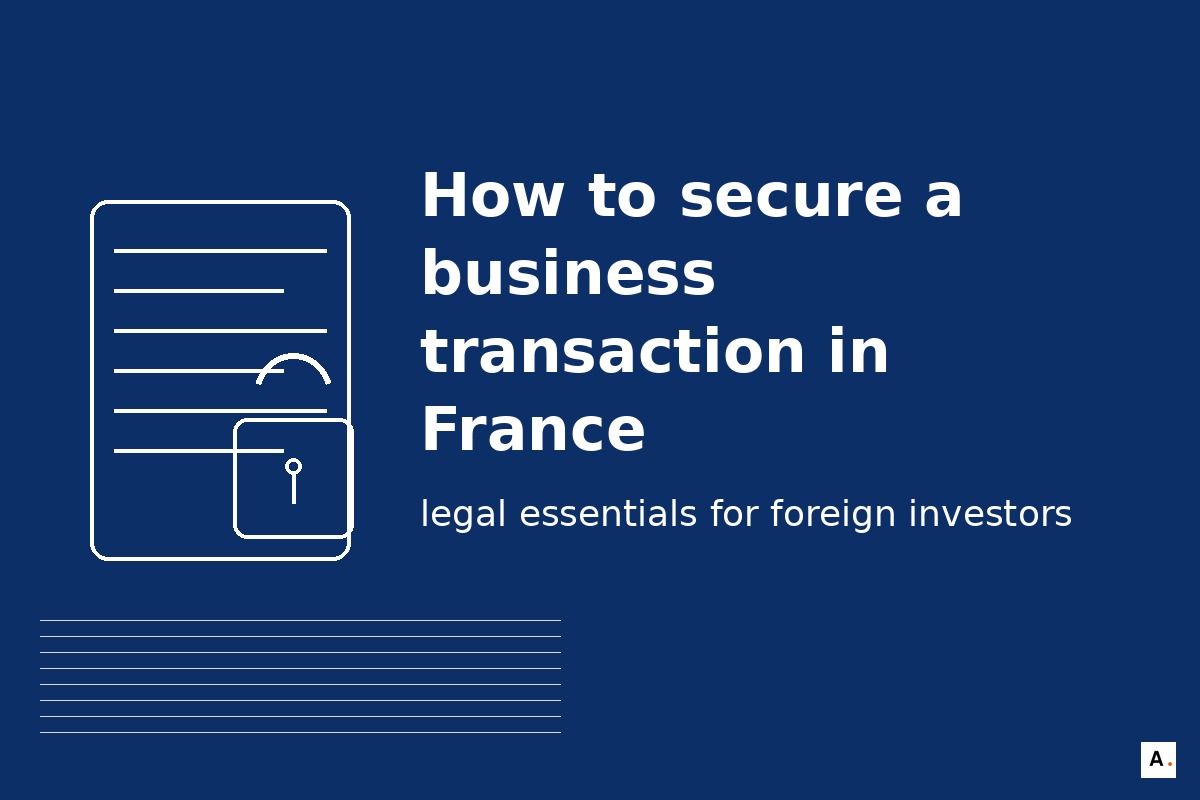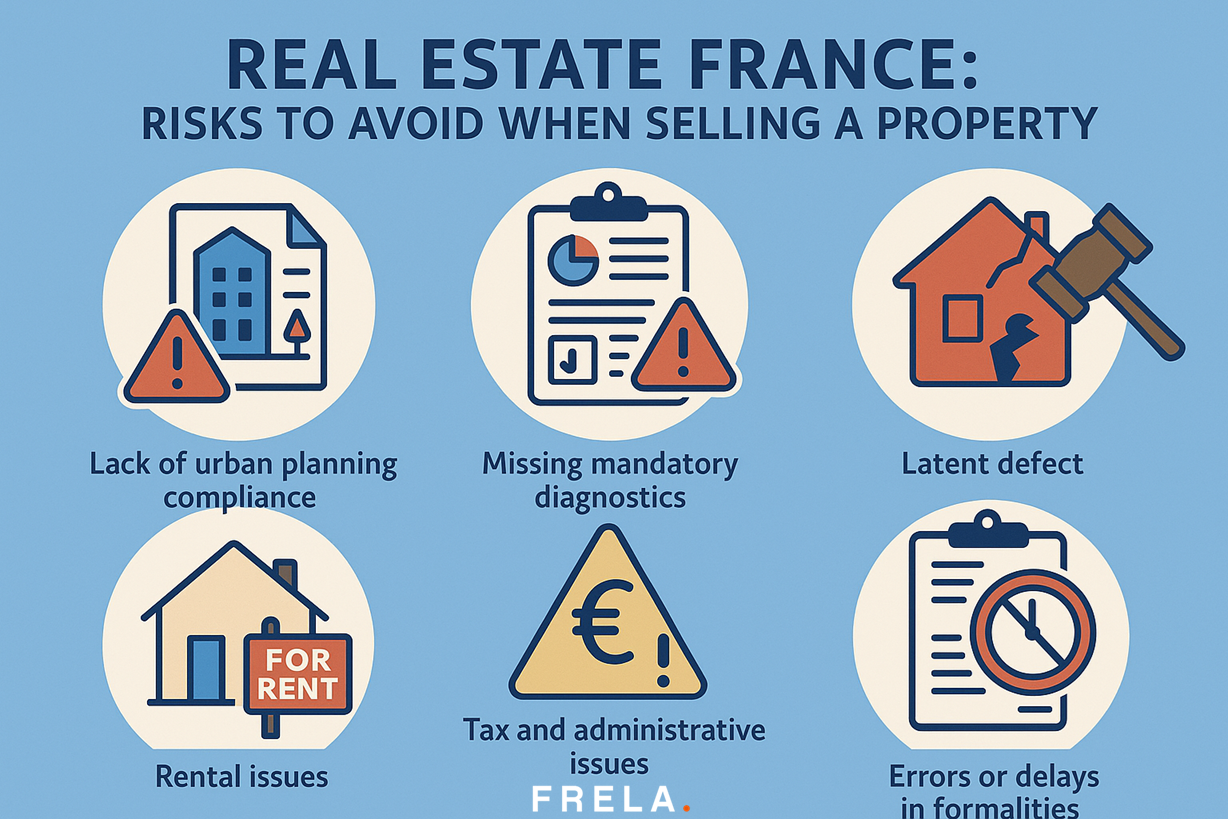How to secure a business transaction in France: legal essentials for foreign investors
Introduction: mitigating risks in French business deals
France is an attractive destination for foreign investors acquiring or partnering in businesses, but every business transaction carries risks. Whether you are investing in a French startup, acquiring a well-established company, or entering a joint venture, it’s critical to secure the transaction through careful legal planning and due diligence. “Securing” a business deal means protecting your interests at each stage: negotiating clear terms, complying with French legal requirements, and anticipating potential pitfalls (from hidden liabilities to regulatory approvals) so they don’t derail the deal.
This section provides an overview of the legal essentials a foreign investor should consider to ensure a smooth and safe business transaction in France. We will cover the key phases: due diligence, negotiation and contracting, regulatory compliance (like competition and foreign investment rules), and closing formalities. By understanding these essentials, foreign investors can approach French transactions with confidence and avoid unpleasant surprises.


Thorough Due Diligence: Knowing What You’re Buying
Before signing any binding agreement, a foreign investor should conduct due diligence on the French target business. Due diligence is the investigative process of reviewing the target’s legal, financial, tax, and operational situation. In France, as elsewhere, this typically includes examining corporate records, contracts, permits, employee arrangements, litigation, intellectual property rights, and financial statements of the target company.
Engage a French legal team and accountants to assist, since local expertise is key to spot issues (like checking that the company’s Kbis extract from the registry is clean, verifying property titles in the French land registry, etc.). Some items to focus on:
- Corporate structure and compliance: Review the company’s bylaws, cap table (shareholders), minutes of past meetings, any shareholders’ agreements, and outstanding securities. Verify that the target is duly incorporated and that the persons signing on its behalf have authority. Check for any pledges of shares or options that could affect your acquisition.
- Contracts and liabilities: Request material contracts – with customers, suppliers, leases, loans, etc. Pay attention to any change-of-control clauses that could allow termination if the company is sold. If you find such clauses (common in some contracts and licenses), you may need to get consents or structure around them. Investigate outstanding debt and whether any is personally guaranteed by the seller or needs refinancing. Look at any litigation or disputes; under French law, lawsuits stay with the company (if you buy shares, the company remains the defendant for any pending case). Tax liabilities should be checked – perhaps obtain recent tax clearance or see if any tax audits are in progress.
- Employment matters: France has protective labor laws, so ensure the target has properly documented employment contracts, that it’s up to date on social security contributions, and that there are no looming disputes with employees or unions. If the target has a works council (CSE), note that this body must be informed/consulted prior to the acquisition closing (in deals meeting certain size thresholds). Confirm whether any key employees have change-of-control bonuses or rights to resign with indemnity if the company is acquired.
- Intellectual Property and Regulatory: If the business relies on patents, trademarks, or software, confirm these IP assets are owned or licensed properly by the target. In some cases, past employees or founders might not have signed invention assignment deeds – this should be resolved before you proceed. Also verify if the business needs any licenses (for example, operating permits, GDPR data protection compliance, sector-specific authorizations). An issue in regulatory compliance can threaten the continuity of the business post-acquisition if not addressed.
By knowing the ins and outs of the target, you can either negotiate protections for any risks found or decide to walk away if the risks are too high. French sellers are used to due diligence processes, and they will often populate a data room for review. Keep in mind, if you discover a problem and still choose to proceed without getting it fixed or covered by warranty, you may have a hard time complaining about it later. So better to raise and resolve issues before signing.
The Negotiation: Letters of Intent and Key Terms
In many French transactions, the parties sign a letter of intent (LOI) or term sheet before the final contract. This LOI (sometimes called a protocole d’accord or offre d’achat when initiated by buyer) sets out the main agreed terms: price, what is being acquired (shares or assets), any conditions precedent, timeline, and often exclusivity (the seller agrees not to solicit other offers for a period). Typically, an LOI is stated to be non-binding except for certain clauses (like confidentiality and exclusivity). However, foreign investors should be cautious: while French courts will generally respect non-binding clauses, the duty of good faith in negotiations means that breaking off talks abruptly or reneging on key points could potentially incur liability in tort (Article 1112 of the Civil Code) if it causes unjustified harm to the other party. To be safe, clearly delineate which provisions are binding and consider including a governing law clause even at LOI stage if cross-border (though usually the final SPA will cover that).
Key terms to negotiate upfront include:
- Price and Adjustments: Determine if the price is fixed or subject to adjustment (e.g., based on closing accounts, or a net debt and working capital adjustment). In France, both locked-box (fixed price with interest if profits are drained pre-closing) and closing accounts mechanisms are used. Be clear on currency (Article 1343-3 of the Civil Code explicitly allows contracts between professionals to be in a foreign currency commonly used in the transaction – so you can price in USD or EUR as you prefer).
- Reps and Warranties: French deals usually involve the seller giving contractual representations and warranties about the company’s condition (since there is no extensive concept of implied warranties for business sales, aside from basic title guarantee). These will be later detailed in the SPA, but you can outline in the LOI that extensive warranties will be provided, and possibly that a warranty indemnity mechanism (garantie d’actif et de passif) will be included. Under French practice, reps & warranties are the tool to mitigate risks identified – essentially a contractual assurance from seller that if unknown liabilities crop up post-deal, the buyer can recover damages. Foreign investors should push for a solid set of warranties and possibly an escrow or purchase price retention to secure any indemnity claims.
- Conditions Precedent: Identify any regulatory approvals needed: for instance, merger control clearance if the companies are large. France has its own antitrust thresholds, and the EU has its thresholds – if your transaction meets the criteria (based on turnover of the parties), you must notify and get approval from either the French Competition Authority or the European Commission before closing. Also, FDI approval if applicable (discussed below) should be a condition. If you require financing or approval from your board or government (e.g., if you’re a state-owned foreign entity), include those conditions. French law allows conditions precedent as long as they are not potestative purely (i.e., one-sided arbitrary conditions).
- Timeline and Exclusivity: Lock in a timetable for due diligence, signing, and closing. If you’re committing resources to this deal, an exclusivity clause (seller won’t negotiate with others for some period) is advisable. Under French law, exclusivity agreements are generally enforceable according to their terms (with damages or even injunction possible for breach, though injunction is rare in practice).
Negotiating a French deal as a foreigner also means bridging cultural styles – French counterparts may expect more direct communication on points like employee integration or long-term strategy, as there is often a social angle to M&A in France (will you lay off staff? etc.). Being forthright and having a plan for the company can actually help in negotiations, especially if management or family sellers care about legacy.
Compliance with Legal and Regulatory Requirements
Foreign Investment Regulations: If you as a foreign investor (especially from outside the EU/EEA) are acquiring a significant stake in a French company, verify whether the foreign investment control applies. As detailed earlier, certain sectors require prior authorization from the Ministry of Economy for foreign investments beyond 25% or involving control. It is crucial to file the request in a timely manner; typically this is done as soon as the deal is sufficiently defined, and the deal can be signed “subject to FDI approval”. Do not skip this if it’s required – a closing without mandatory approval is voidable and can carry heavy fines. In recent times, areas like defense, cybersecurity, AI, energy, and even parts of healthcare are covered. If your deal triggers it, engage French counsel who specialize in FDI filings. The good news is that most requests get approved (often with conditions). The process takes up to 2 months (30 business days initial review + 45 additional if deep review). Plan that into your closing timetable.
Antitrust (Merger Control): As noted, if the companies have revenues above certain thresholds (e.g., roughly €150m France combined and €50m France each for French review, or higher EU-wide thresholds for EU review), you need to file for merger clearance. This is a suspensory condition – you must wait for the authority’s green light. The French Competition Authority typically gives a decision in phase 1 within 25 business days for straightforward cases. EU Commission can take longer. Ensure you prepare necessary information early. Also, even if below thresholds, if it’s a joint venture creation that might coordinate parents, consider antitrust compliance (Article 101 TFEU) – if two competitors form a JV, the joint venture should not be simply a cover for cartel-like behavior. The European Commission has guidelines on this. Essentially, the JV must be a genuine, autonomous full-function entity to escape Article 101 scrutiny, otherwise the cooperation agreement between parents might need to be analyzed under antitrust rules.
Employee Processes: In France, if the target has a works council (CSE), you must inform/consult it about the acquisition. This is separate from the Hamon law info to employees discussed earlier (that one is the seller’s obligation in small companies). For larger companies, the CSE consultation is a mandatory step before the decision to acquire is finalized. Failing to consult doesn’t void an acquisition but can lead to fines. So, coordinate with the seller on this process – often the seller organizes the consultation as it knows its employees best, but the buyer might attend some meetings to present plans.
Environmental and Other Specifics: Depending on the industry, check for environmental liabilities. France has strong environmental laws (some liabilities can follow property owners or operators). If acquiring an industrial site, environmental audits are prudent.
Data Protection: If part of the transaction involves transferring personal data (customer lists, etc.), comply with GDPR. Typically, during due diligence only anonymized data is shared, and upon closing you ensure data subjects are informed of the new controller if required.
In sum, foreign investors must navigate these compliance steps to “secure” the deal – meaning to ensure the deal is legally valid and won’t be later unwound or penalized by authorities. It’s wise to include clauses in the contract on what happens if an authority blocks the deal or requires divestitures, etc.
Crafting a Solid Purchase Agreement
The backbone of a secure transaction is a well-drafted Share Purchase Agreement (SPA) or Asset Purchase Agreement (APA). Under French law, you have wide freedom to contract, so you can tailor the SPA to allocate risks as you see fit. Some points to get right:
- Representations & Warranties and Indemnities: As mentioned, these clauses are critical. The seller’s reps should cover title to shares/assets, financial statements accuracy, absence of undisclosed liabilities, compliance with laws, etc. In France, it’s common to use a separate guarantee agreement (garantie d’actif et de passif) either as part of the SPA or a schedule, which spells out indemnification: if any of the guaranteed items (usually assets and liabilities as of closing) is inaccurate, the seller will indemnify the buyer. Negotiate the survival period of warranties (often 18–24 months for general, longer for tax and social security until expiration of government audit periods), any caps (liability cap maybe 10%–30% of price for general warranties, possibly up to full price for fundamental warranties like title), and a deductible or threshold to avoid trivial claims. If the seller is a foreign entity or one you worry about enforcing against, consider an escrow holdback of part of the price for the warranty period.
- Covenants and Interim Period: The SPA should have covenants, especially if there’s a gap between signing and closing (while waiting for approvals). Typically, the seller covenants to run the business in the ordinary course, not to do anything abnormal like new loans, firing key staff, etc., without buyer’s consent. Include a clause that seller will assist in obtaining any third-party consents needed.
- Termination rights: Specify what happens if conditions precedent (CPs) aren’t met by a deadline. Each party should have a right to terminate if, say, regulatory approval is denied or not obtained by X date. Also, if a material adverse event occurs to the target pre-closing, do you have the right to withdraw? French deals sometimes have MAC (Material Adverse Change) clauses, but French courts interpret them strictly (and if it’s too vague, they could consider it potestative and void). So if you want a MAC clause, define it clearly (e.g., revenue drop of Y% or loss of major customer, etc., can allow walk-away).
- Closing and Transfer Formalities: Outline the mechanics at closing. In a share deal, share transfer forms (ordre de mouvement) will be signed, the buyer will be registered in the company’s share register, and usually new directors may be appointed. In an asset deal, you’d have bills of sale, assignment deeds for contracts, etc. Make a closing checklist part of the SPA. Also, decide where closing happens – it can be anywhere, but often at a notary or lawyer’s office for formality (especially if any notarization is needed, like real estate transfer). For cross-border, consider using electronic signature if legally acceptable (France recognizes e-signatures, though certain corporate acts might still be done on paper for registration).
- Governing Law and Dispute Resolution: Many foreign investors might prefer their home law or a neutral law, but when acquiring a French company, it’s most common to use French law for the SPA (especially if it’s shares of an SAS or SARL, since the transfer procedures refer to French law concepts). French law is well-developed for M&A contracts, and you can choose an international arbitration (Paris is a major arbitration venue) or French courts for disputes. Arbitration can be faster and confidential, but more costly; French courts are an option since a foreign investor might trust the sophistication of, say, the Paris Commercial Court for business disputes. Also note, if the counterparty is French, they may insist on French law – it’s a reasonable ask given the subject matter. In any event, ensure a trustworthy dispute mechanism is in place.
By solidifying these contract terms, you legally secure your transaction – meaning you have recourse if things go wrong, and clarity on both sides’ obligations.
.
Closing the Deal: Execution and Post-Closing Matters
On closing day, a few legal essentials:
- Funds transfer: typically done via wire transfer in euros (or agreed currency). Make sure to account for any escrow arrangement.
- Share transfer registration: If it’s a share deal, after closing the buyer’s ownership must be updated in the company’s official registers. And within 30 days, the transfer must be registered with the tax authorities with payment of stamp duty (0.1% for most shares of SAS/SARL). Often the notary or lawyer handles this formality by submitting the signed securities transfer forms (acte de cession) to the tax service.
- Public announcements: For asset deals (fonds de commerce sales), a closing triggers legal notices in a journal and a Bodacc announcement, and the purchase price might be sequestered for a period to allow creditors to claim (this is unique to fonds de commerce sales). For share deals, no public announcement is legally required (unless the company is listed or certain regulated sectors). However, if an acquisition pushes ownership above certain thresholds in a public company, the buyer must declare to the stock market regulator (AMF) and maybe launch a tender offer if crossing 30% (mandatory bid threshold in listed companies).
- Post-closing integration: Legally, ensure any changes in directors or address are filed with the RCS via the one-stop (within 30 days). If a foreign parent now indirectly controls a French company, that subsidiary might need to file annual consolidated accounts or declare a foreign parent for statistical purposes (e.g., INSEE economic surveys).
Finally, keep an eye on any earn-out or deferred price conditions if negotiated, and formalize employment of key persons post-acquisition (maybe you signed new contracts effective at closing).
Conclusion: Diligence and Good Counsel as Your Security
Securing a business transaction in France as a foreign investor boils down to rigorous preparation and adherence to French legal procedures. Conduct thorough due diligence so you fully understand the target and its risk profile. Negotiate a clear, comprehensive agreement that protects you through warranties and proper conditions. Comply with French and EU regulatory requirements – these are not optional, and early planning for them prevents last-minute hiccups. And always document everything meticulously, from the LOI stage to closing filings.
France has a reliable legal system for business transactions. Contracts are enforceable, and the courts or arbitration panels will generally uphold the written agreements, including foreign investor rights, provided procedures are followed. By engaging experienced French counsel and maintaining open communication with the seller about fulfilling legal obligations (like employee consultations or regulatory filings), you build trust and reduce risk on both sides.
In essence, a “secure” transaction is one where there are no loose ends: all parties know their rights and duties, all approvals are obtained, and the business changes hands smoothly. With the legal essentials covered, a foreign investor can focus on the strategic goal of the investment – growing and profiting from the newly acquired French business – rather than battling unforeseen legal troubles. As the saying goes, an ounce of prevention is worth a pound of cure: investing time and resources in securing the deal upfront will pay off enormously in peace of mind and in the long-term success of your French venture.
About the Author :
Business lawyers, bilingual, specialized in acquisition law; Benoit Lafourcade is co-founder of Delcade lawyers & solicitors and founder of FRELA; registered as agents in personal and professional real estate transactions. Member of AAMTI (main association of French lawyers and agents).
FRELA : French Real Estate Lawyer Agency, specializing in acquisition law to secure real estate and business transactions in France.
Paris, 15 rue Saussier-Leroy, Paris
Bordeaux, 24 Rue du manège, 33000 Bordeaux
Lille, 40 Theater Square, 59800 Lille

This article is provided for general information only and may not reflect the most recent legal or tax developments. It does not constitute legal advice. Please contact us for personalised guidance before making any decision.




